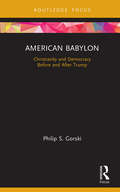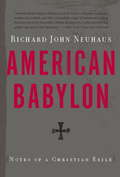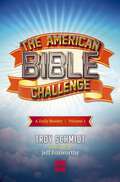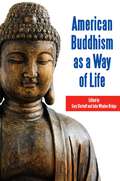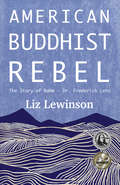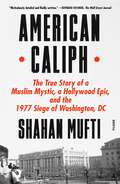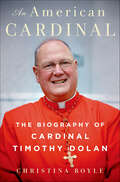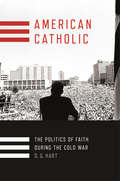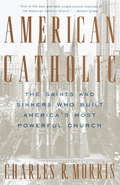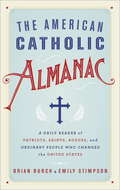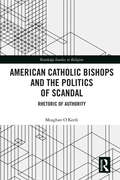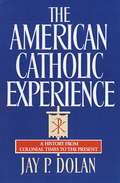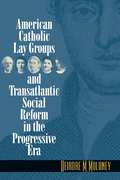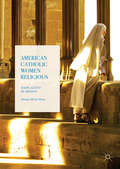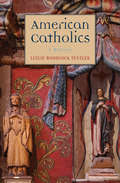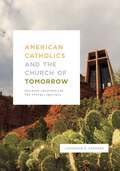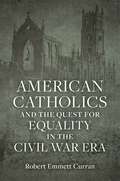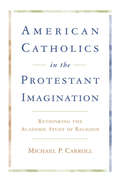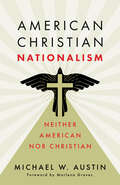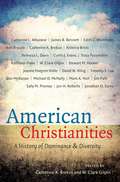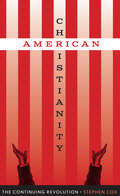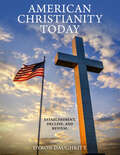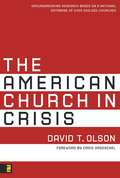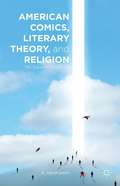- Table View
- List View
American Babylon: Christianity and Democracy Before and After Trump (Routledge Focus on Religion)
by Philip S. GorskiWhy did 81 percent of white evangelicals vote for Donald Trump in 2016? And what does this tell us about the relationship between Christianity and democracy in the United States? American Babylon places our present political moment against a deep historical backdrop. In Part I the author traces the development of democratic institutions from Ancient Greece through to the American Revolution and of Christian political theology from Augustine to Falwell. Part II charts the decline of democratic governance within American churches; explains the capture of evangelical Christianity by the Republican Party; and denounces the fateful embrace between white Christian nationalists and right-wing populists that culminated in Trump’s victory. An accessible and timely book, American Babylon is essential reading for those concerned with the vexed relationship of religion and politics in the United States, including students and scholars in the fields of divinity, history, political science, religious studies, and sociology.
American Babylon: Notes of a Christian Exile
by Richard John NeuhausChristians are by their nature a people out of place. Their true home is with God; in civic life, they are alien citizens "in but not of the world. " InAmerican Babylon, eminent theologian Richard John Neuhaus examines the particular truth of that ambiguity for Catholics in America today. Neuhaus addresses the essential quandaries of Catholic life-assessing how Catholics can keep their heads above water in the sea of immorality that confronts them in the world, how they can be patriotic even though their true country is not in this world, and how they might reconcile their duties as citizens with their commitment to God. Deeply learned, frequently combative, and always eloquent,American Babylonis Neuhaus'smagnum opus-and will be essential reading for all Christians.
The American Bible Challenge: A Daily Reader Volume 1
by Troy SchmidtA fun and challenging way to dig into the Bible In fall 2012, a new show premiered on the Game Show Network that quickly surprised Hollywood. Hosted by Jeff Foxworthy, The American Bible Challenge built up an audience of 2.3 million viewers in just nine weeks, making it the highest-rated show ever in GSN history. By taking on unique questions spanning all of Scripture, teams excitedly won money, not for themselves, but for a favorite charity. The interest has grown so fast in recent months, a second season hits the airwaves in March 2013. Now, the consulting producer for the show, Troy Schmidt, with a foreword written by host Jeff Foxworthy, has released a daily reader based on The American Bible Challenge designed to take us deeper into the questions from the show and the life applications that they inspire. Using many of the questions from the first season as a guide, each day features an inspiring lesson along with five challenging Bible questions to take you deeper into Scripture. The book guides the reader through nine weeks of study and encouragement--the same length of time as a season of The American Bible Challenge--with over three hundred questions to test your Bible knowledge. And don't worry, all the answers are in the back. The American Bible Challenge Daily Reader includes questions to deepen your knowledge and to change your life. Are you ready to jump in and take the challenge?
American Buddhism as a Way of Life (SUNY series in Buddhism and American Culture)
by Gary Storhoff John Whalen-BridgeThe US seems to be becoming a Buddhist country. Celebrity converts, the popularity of the Dalai Lama, motifs in popular movies, and mala beads at the mall indicate an increasing inculcation of Buddhism into the American consciousness, even if a relatively small percentage of the population actually describe themselves as Buddhists. This book looks beyond the trendier manifestations of Buddhism in America to look at distinctly American Buddhist ways of life—ways of perceiving and understanding. John Whalen-Bridge and Gary Storhoff have organized this unique collection in accordance with the Buddhist concept of the Three Jewels: the Buddha, the Dharma, and the Sangha. The Buddha section discusses the two key teachers who popularized Buddhism in America: Alan Watts and D. T. Suzuki and the particular kinds of spirituality they proclaimed. The Dharma section deals with how Buddhism can enlighten current public debates and a consideration of our national past with explorations of bioethics, abortion, end-of-life decisions, and consciousness in late capitalism. The final section on the Sangha, or community of believers, discusses how Buddhist communities both formal and informal have affected American society with chapters on family life, Nisei Buddhists, gay liberation, and Zen gardens.
American Buddhist Rebel: The Story of Rama - Dr. Frederick Lenz
by Liz LewinsonWinner of the 2016 Eric Hoffer Award, this acclaimed biography of the brilliant, controversial Buddhist teacher Rama - Dr. Frederick Lenz (1950 - 1998) is this free-spirited adventure of a wild, sports jock teenager who transforms into an iconoclastic, innovative leader, boundary breaking is de rigueur as reported by the 100+ students and colleagues interviewed by author Liz Lewinson. Meditation, the empowerment of women and career as practice are but three of the core teachings covered in this book. Dr. Lenz ran into opposition, of course, but he kept his priorities straight. When he visited Nepal at age 19, he encountered an aged monk who informed him that he was a lineage bearer. He was to revive an ancient school of enlightenment. He was to find his many past life students and help them achieve joyous enlightenment in this life or at least set them securely on the path. He was to do this in the West, using Western means. In the East, centuries-old traditions maintain meditative pathways to enlightenment. In the West, facing a blank canvas, Dr. Lenz found new ways to build mental/meditative prowess through careers such as computer science, visits to American "places of power," knowledge about real gender equilibrium, movies, music, and dance. He taught these skills to American students and observed their success. When you read this fast-paced biography, you enter the inner teaching circle of baseline American Buddhism. "This fascinating biography captures the wisdom of a genuine, compelling teacher who combined absolute miracles with humor, fun, and adventure. When you read this fast-paced book, you feel you are there, learning and transforming. This is an original and exciting read." -- Lynn Andrews, author of The Medicine Woman Series
American Caliph: The True Story of a Muslim Mystic, a Hollywood Epic, and the 1977 Siege of Washington, DC
by Shahan MuftiOne of Publishers Weekly's best nonfiction books of 2022The riveting true story of America’s first homegrown Muslim terror attack, the 1977 Hanafi siege of Washington, D.C. Late in the morning of March 9, 1977, seven men stormed the Washington, D.C., headquarters of B’nai B’rith International, the largest and oldest Jewish service organization in America. The heavily armed attackers quickly took control of the building and held more than a hundred employees of the organization hostage inside. A little over an hour later, three more men entered the Islamic Center of Washington, the country’s largest and most important mosque, and took hostages there. Two others subsequently penetrated the District Building, a few hundred yards from the White House. When a firefight broke out, a reporter was killed, and Marion Barry, later to become mayor of Washington, D.C., was shot in the chest. The deadly standoff brought downtown Washington to a standstill. The attackers belonged to the Hanafi Movement, an African American Muslim group based in D.C. Their leader was a former jazz drummer named Hamaas Abdul Khaalis, who had risen through the ranks of the Nation of Islam before feuding with the organization’s mercurial chief, Elijah Muhammad, and becoming a spiritual authority to Kareem Abdul-Jabbar. Like Malcolm X, Khaalis had become sharply critical of the Nation’s unorthodox style of Islam. And, like Malcolm X, he paid dearly for his outspokenness: In 1973, followers of the Nation murdered seven Hanafis at their headquarters, including several members of Khaalis’s family. When they took hostages in 1977, one of the Hanafis’ demands was for the murderers, along with Muhammad Ali and Elijah’s son, to be turned over to the group to face justice. They also demanded that the American premiere of Mohammad: Messenger of God—an epic about the life of the prophet Muhammad financed and supported by the Libyan leader Muammar Gadhafi—be canceled and the film destroyed. The lives of 149 hostages hung in the balance, and the United States’ fledgling counterterrorism forces—as yet untested—would have to respond. Shahan Mufti’s American Caliph gives a full account of the largest ever hostage taking on American soil and of the man who masterminded it. Informed by extensive archival research and access to hundreds of declassified FBI files, American Caliph is a riveting true-crime story that sheds new light on the disarray of the 1970s and its ongoing reverberations.
An American Cardinal: The Biography of Cardinal Timothy Dolan
by Christina BoyleThe most powerful Roman Catholic leader in the United States had humble beginnings. Timothy Michael Dolan was born in Maplewood, Missouri in 1950. From an early age, those around him knew that he would become a priest. Through college and seminary, his power and spirituality grew. He was formally ordained in 1976. In 2009, he was made Archbishop of New York. Several months later he was elevated to cardinal. There were clear signs that the ailing Pope Benedict XVI saw him as a bright hope for the future. During the 2013 conclave, Vatican experts seriously wondered if he would be chosen to lead the Catholics of the world. The cardinal's rise is not, however, without its controversies. He was one of the Catholic leaders who dealt, harshly say some, with abusers and the abused in the church's sex scandal. He is a consummate player who doesn't shy away from picking a political battle. Christina Boyle's An American Cardinal is a book about power and the Roman Catholic church today framed by the life of a man who might someday become the first American pope.
American Catholic: The Politics of Faith During the Cold War (Religion and American Public Life)
by D. G. HartAmerican Catholic places the rise of the United States' political conservatism in the context of ferment within the Roman Catholic Church. How did Roman Catholics shift from being perceived as un-American to emerging as the most vocal defenders of the United States as the standard bearer in world history for political liberty and economic prosperity? D. G. Hart charts the development of the complex relationship between Roman Catholicism and American conservatism, and shows how these two seemingly antagonistic ideological groups became intertwined in advancing a certain brand of domestic and international politics. Contrary to the standard narrative, Roman Catholics were some of the most assertive political conservatives directly after World War II, and their brand of politics became one of the most influential means by which Roman Catholicism came to terms with American secular society. It did so precisely as bishops determined the church needed to update its teaching about its place in the modern world. Catholics grappled with political conservatism long before the supposed rightward turn at the time of the Roe v. Wade decision in 1973.Hart follows the course of political conservatism from John F. Kennedy, the first and only Roman Catholic president of the United States, to George W. Bush, and describes the evolution of the church and its influence on American politics. By tracing the roots of Roman Catholic politicism in American culture, Hart argues that Roman Catholicism's adaptation to the modern world, whether in the United States or worldwide, was as remarkable as its achievement remains uncertain. In the case of Roman Catholicism, the effects of religion on American politics and political conservatism are indisputable.
American Catholic
by Charles Morris"A cracking good story with a wonderful cast of rogues, ruffians and some remarkably holy and sensible people." --Los Angeles Times Book ReviewBefore the potato famine ravaged Ireland in the 1840s, the Roman Catholic Church was barely a thread in the American cloth. Twenty years later, New York City was home to more Irish Catholics than Dublin. Today, the United States boasts some sixty million members of the Catholic Church, which has become one of this country's most influential cultural forces.In American Catholic: The Saints and Sinners Who Built America's Most Powerful Church, Charles R. Morris recounts the rich story of the rise of the Catholic Church in America, bringing to life the personalities that transformed an urban Irish subculture into a dominant presence nationwide. Here are the stories of rogues and ruffians, heroes and martyrs--from Dorothy Day, a convert from Greenwich Village Marxism who opened shelters for thousands, to Cardinal William O'Connell, who ran the Church in Boston from a Renaissance palazzo, complete with golf course. Morris also reveals the Church's continuing struggle to come to terms with secular, pluralist America and the theological, sexual, authority, and gender issues that keep tearing it apart. As comprehensive as it is provocative, American Catholic is a tour de force, a fascinating cultural history that will engage and inform both Catholics and non-Catholics alike."The best one-volume history of the last hundred years of American Catholicism that it has ever been my pleasure to read. What's appealing in this remarkable book is its delicate sense of balance and its soundly grounded judgments." --Andrew GreeleyFrom the Trade Paperback edition.
The American Catholic Almanac
by Brian Burch Emily StimpsonWHAT DO BUFFALO BILL , JOHN F. KENNEDY, VINCE LOMBARDI , DOROTHY DAY, FULTON SHEEN, AND ANDY WARHOL HAVE IN COMMON? They're all Catholics who have shaped America. In this page-a-day history, 365 inspiring stories celebrate the historic contributions of American men and women shaped by their Catholic faith. From famous figures to lesser-known saints and sinners, The American Catholic Almanac tells the fascinating, funny, uplifting, and unlikely tales of Catholics' influence on American history, culture, and politics. Spanning the scope of the Revolutionary War to Notre Dame football, this unique collection of stories highlights the transformative role of the Catholic Church in American public life over the last 400 years.Did you know...* The first immigrant to arrive in America via Ellis Island was a 15-year-old Irish Catholic girl?* Al Capone's tombstone reads "MY JESUS MERCY"?* Andrew Jackson credited America's victory in the Battle of New Orleans to the prayers of the Virgin Mary and the Ursuline Sisters?* Five Franciscans died in sixteenth-century Georgia defending the Church's teachings on marriage?* Jack Kerouac died wanting to be known as a Catholic and not only as a beat poet?* Catholic missionaries lived in Virginia 36 years before the English settled Jamestown?From the Hardcover edition.
American Catholic Bishops and the Politics of Scandal: Rhetoric of Authority (Routledge Studies in Religion)
by Meaghan O'KeefeThis book explores the rhetoric and public communication of the Catholic Church in the United States in the wake of the sexual abuse scandals and offers a demonstration of how large organizations negotiate a loss of public trust while retaining political power. While the Catholic Church remains a major political force in the United States, recent scandals have undoubtedly had an adverse effect on both its reputation and moral authority. This has been exacerbated by the public responses of Catholic clergy, which have often left supporters of the Church, let alone critics, profoundly unsatisfied. Drawing on documents – voting guides, pastoral letters, sermons, press releases, and other materials – issued by the United States Conference of Catholic Bishops (USCCB) as well as American nuns, the book explores Catholic political statements issued after the sexual abuse crises entered the public consciousness. Using approaches from linguistics and rhetoric, it analyses how these statements compare to similar materials issued before this time. This comparison demonstrates that for the American Catholic Church persuasion is less important than maintaining the impression that there has been no loss of authority. This is a timely study of the Catholic Church’s handling of the recent revelations of abuse within the Church. As such, it will be of keen interest to scholars of religious rhetoric, contemporary Catholicism, linguistics, rhetoric, communication, and religious studies.
The American Catholic Experience: A History from Colonial Times to the Present
by Jay P. Dolans Reprint of the Doubleday edition originally published in 1985 and included in BCL3. Annotation c. by Book News, Inc. , Portland, Or.
American Catholic Lay Groups and Transatlantic Social Reform in the Progressive Era
by Deirdre M. MoloneyTracing the development of social reform movements among American Catholics from 1880 to 1925, Deirdre Moloney reveals how Catholic gender ideologies, emerging middle-class values, and ethnic identities shaped the goals and activities of lay activists. Rather than simply appropriate American reform models, ethnic Catholics (particularly Irish and German Catholics) drew extensively on European traditions as they worked to establish settlement houses, promote temperance, and aid immigrants and the poor. Catholics also differed significantly from their Protestant counterparts in defining which reform efforts were appropriate for women. For example, while women played a major role in the Protestant temperance movement beginning in the mid-nineteenth century, Catholic temperance remained primarily a male movement in America. Gradually, however, women began to carve out a significant role in Catholic charitable and reform efforts. <P>The first work to highlight the wide-ranging contributions of the Catholic laity to Progressive-era reform, the book shows how lay groups competed with Protestant reformers and at times even challenged members of the Catholic hierarchy. It also explores the tension that existed between the desire to demonstrate the compatibility of Catholicism with American values and the wish to preserve the distinctiveness of Catholic life.
American Catholic Women Religious: Radicalized by Mission
by Donna Maria MosesThis book depicts the significant role played by American Catholic Women Religious in the broader narratives of modern American history and the history of the Catholic Church. The book is a guide to fifty foreign missions founded by Dominican and Maryknoll Sisters in the twentieth century. Sister Donna Moses examines root causes for the radical political stances taken by American Catholic Women Religious in the latter half of the century and for the conservative backlash that followed. The book identifies key events that contributed to the present state of division within the American Catholic Church and describes current efforts to engage in dynamic dialogue.
American Catholics: A History (Cushwa Center Studies Of Catholicism In Twentieth-century America)
by Leslie Woodcock TentlerA sweeping history of American Catholicism from the arrival of the first Spanish missionaries to the present This comprehensive survey of Catholic history in what became the United States spans nearly five hundred years, from the arrival of the first Spanish missionaries to the present. Distinguished historian Leslie Tentler explores lay religious practice and the impact of clergy on Catholic life and culture as she seeks to answer the question, What did it mean to be a "good Catholic" at particular times and in particular places? In its focus on Catholics' participation in American politics and Catholic intellectual life, this book includes in-depth discussions of Catholics, race, and the Civil War; Catholics and public life in the twentieth century; and Catholic education and intellectual life. Shedding light on topics of recent interest such as the role of Catholic women in parish and community life, Catholic reproductive ethics regarding birth control, and the Catholic church sex abuse crisis, this engaging history provides an up-to-date account of the history of American Catholicism.
American Catholics and the Church of Tomorrow: Building Churches for the Future, 1925–1975
by Catherine R. OsborneIn the mid-twentieth century, American Catholic churches began to shed the ubiquitous spires, stained glass, and gargoyles of their European forebears, turning instead toward startling and more angular structures of steel, plate glass, and concrete. But how did an institution like the Catholic Church, so often seen as steeped in inflexible traditions, come to welcome this modernist trend? Catherine R. Osborne’s innovative new book finds the answer: the alignment between postwar advancements in technology and design and evolutionary thought within the burgeoning American Catholic community. A new, visibly contemporary approach to design, church leaders thought, could lead to the rebirth of the church community of the future. As Osborne explains, the engineering breakthroughs that made modernist churches feasible themselves raised questions that were, for many Catholics, fundamentally theological. Couldn’t technological improvements engender worship spaces that better reflected God's presence in the contemporary world? Detailing the social, architectural, and theological movements that made modern churches possible, American Catholics and the Churches of Tomorrow breaks important new ground in the history of American Catholicism, and also presents new lines of thought for scholars attracted to modern architectural and urban history.
American Catholics and the Quest for Equality in the Civil War Era
by Robert Emmett CurranRobert Emmett Curran’s masterful treatment of American Catholicism in the Civil War era is the first comprehensive history of Roman Catholics in the North and South before, during, and after the war. Curran provides an in-depth look at how the momentous developments of these decades affected the entire Catholic community, including Black and indigenous Americans. He also explores the ways that Catholics contributed to the reshaping of a nation that was testing the fundamental proposition of equality set down by its founders. Ultimately, Curran concludes, the revolution that the war touched off remained unfinished, indeed was turned backward, in no small part by Catholics who marred their pursuit of equality with a truncated vision of who deserved to share in its realization.
American Catholics in the Protestant Imagination: Rethinking the Academic Study of Religion
by Michael P. CarrollMichael P. Carroll argues that the academic study of religion in the United States continues to be shaped by a "Protestant imagination" that has warped our perception of the American religious experience and its written history and analysis.In this provocative study, Carroll explores a number of historiographical puzzles that emerge from the American Catholic story as it has been understood through the Protestant tradition. Reexamining the experience of Catholicism among Irish immigrants, Italian Americans, Acadians and Cajuns, and Hispanics, Carroll debunks the myths that have informed much of this history.Shedding new light on lived religion in America, Carroll moves an entire academic field in new, exciting directions and challenges his fellow scholars to open their minds and eyes to develop fresh interpretations of American religious history.
American Christian Nationalism: Neither American nor Christian
by Michael W. AustinMichael W. Austin shows how nationalism is contrary to American values and Christian virtues—and offers us a better form of civic engagement. In this brief, thought-provoking book, Michael W. Austin turns his keen mind for ethics toward the crisis currently facing our democracy: the rise of American Christian nationalism. Austin first accessibly explains the meaning and history behind nationalism. He then systematically shows how the ideology contradicts American values like liberty, equality, and justice as well as Christian virtues like humility, faith, hope, and love. Ultimately, he argues that the Beloved Community, first developed by Martin Luther King Jr. and others, offers a better model for an authentically Christian and American community. Readers frustrated by partisan strife will find a faithful guide in Austin&’s thoughtful volume.
American Christianities
by Catherine A. Brekus W. Clark GilpinFrom the founding of the first colonies until the present, the influence of Christianity, as the dominant faith in American society, has extended far beyond church pews into the wider culture. Yet, at the same time, Christians in the United States have disagreed sharply about the meaning of their shared tradition, and, divided by denominational affiliation, race, and ethnicity, they have taken stances on every side of contested public issues from slavery to women's rights. This volume of twenty-two original essays, contributed by a group of prominent thinkers in American religious studies, provides a sophisticated understanding of both the diversity and the alliances among Christianities in the United States and the influences that have shaped churches and the nation in reciprocal ways. American Christianities explores this paradoxical dynamic of dominance and diversity that are the true marks of a faith too often perceived as homogeneous and monolithic. Contributors:Catherine L. Albanese, University of California, Santa BarbaraJames B. Bennett, Santa Clara UniversityEdith Blumhofer, Wheaton College Ann Braude, Harvard Divinity SchoolCatherine A. Brekus, University of Chicago Divinity SchoolKristina Bross, Purdue UniversityRebecca L. Davis, University of DelawareCurtis J. Evans, University of Chicago Divinity SchoolTracy Fessenden, Arizona State University Kathleen Flake, Vanderbilt University Divinity SchoolW. Clark Gilpin, University of Chicago Divinity SchoolStewart M. Hoover, University of Colorado at BoulderJeanne Halgren Kilde, University of MinnesotaDavid W. Kling, University of MiamiTimothy S. Lee, Brite Divinity School, Texas Christian UniversityDan McKanan, Harvard Divinity SchoolMichael D. McNally, Carleton CollegeMark A. Noll, University of Notre DameJon Pahl, The Lutheran Theological Seminary at PhiladelphiaSally M. Promey, Yale UniversityJon H. Roberts, Boston UniversityJonathan D. Sarna, Brandeis University
American Christianity: The Continuing Revolution (Discovering America)
by Stephen CoxChristianity takes an astonishing variety of forms in America, from churches that cherish traditional modes of worship to evangelical churches and fellowships, Pentecostal churches, social-action churches, megachurches, and apocalyptic churches—congregations ministering to believers of diverse ethnicities, social classes, and sexual orientations. Nor is this diversity a recent phenomenon, despite many Americans’ nostalgia for an undeviating “faith of our fathers” in the days of yore. Rather, as Stephen Cox argues in this thought-provoking book, American Christianity is a revolution that is always happening, and always needs to happen. The old-time religion always has to be made new, and that is what Americans have been doing throughout their history. American Christianity is an engaging book, wide ranging and well informed, in touch with the living reality of America’s diverse traditions and with the surprising ways in which they have developed. Radical and unpredictable change, Cox argues, is one of the few dependable features of Christianity in America. He explores how both the Catholic Church and the mainline Protestant churches have evolved in ways that would make them seem alien to their adherents in past centuries. He traces the rise of uniquely American movements, from the Mormons to the Seventh-day Adventists and Jehovah’s Witnesses, and brings to life the vivid personalities—Aimee Semple McPherson, Billy Sunday, and many others—who have taken the gospel to the masses. He sheds new light on such issues as American Christians’ intense but constantly changing political involvements, their controversial revisions in the style and substance of worship, and their chronic expectation that God is about to intervene conclusively in human life. Asserting that “a church that doesn’t promise new beginnings can never prosper in America,“ Cox demonstrates that American Christianity must be seen not as a sociological phenomenon but as the ever-changing story of individual people seeking their own connections with God, constantly reinventing their religion, making it more volatile, more colorful, and more fascinating.
American Christianity: The Continuing Revolution (Discovering America)
by Stephen CoxThis wide-ranging study examines the ever-evolving forms of Christianity in the US, and why this constant reinvention is a vital part of American faith. Christianity takes an astonishing variety of forms in America: from traditional chapels to modern megachurches, from evangelical fellowships to social-action groups, and from Pentecostal faith to apocalyptic movements. Stephen Cox argues that radical and unpredictable change is one of the few dependable features of Christianity in America. It is in a necessary and ongoing state of revolution and has been throughout our history. Cox explores how both Catholic and Protestant churches have evolved in ways that would make them seem alien to their past adherents. He traces the rise of uniquely American movements, from the Mormons to the Seventh-day Adventists and Jehovah&’s Witnesses, and brings to life the vivid personalities—Aimee Semple McPherson, Billy Sunday, and many others—who have taken the gospel to the masses. Cox also sheds new light on such issues as American Christians&’ constantly changing political involvements, their controversial revisions in the style and substance of worship, and their chronic expectation that God is about to intervene conclusively in human life. Asserting that &“a church that doesn&’t promise new beginnings can never prosper in America,&” Cox demonstrates that American Christianity must be seen not as a sociological phenomenon but as the ever-changing story of individual seekers.
American Christianity Today: Establishment, Decline, and Revival
by Dyron DaughrityIs the United States a Christian nation? When Europeans first explored and colonized North America, they brought generations of religious conflict and a variety of Christianities with them. The Christian faith has flowered in the United States but has become extremely complex. American Christianity Today gives readers a panoramic view of America's Christians. It makes an excellent text for university courses. In this book, historian Dyron Daughrity clearly and carefully explores a rich array of topics, including: Christianity's interaction with politics; Evangelicalism (and its complexities); Small, rural churches, as well as inner-city ones; Popular American pilgrimage sites; Christian film and music; Women leaders; Megachurches; Pressing issues of today, including race, civil rights, immigration, abortion, and climate change; Roman Catholicism: America's largest denomination; Eastern Orthodoxy; Mormonism, Jehovah's Witnesses, and Seventh-Day Adventists; Youth programs; Christian universities; The Black church tradition, and The rise of the “nones" (those claiming no religion). As a special feature, this book includes extensive photography that illustrates and supports Daughrity's well-researched chapters, helping readers to reflect on the depth and breadth of American Christianity today.
The American Church in Crisis
by David T. OlsonDirector of church planting for the Evangelical Covenant Church, Minnesota-based Olson cites data reported by over 200,000 orthodox Christian churches to raise an alarm, though not in an alarmist manner, he says. On any given Sunday, he says, the vast majority of Americans are absent from church, and church attendance is not keeping up with the country's population growth. Chapter-end questions for reflection and discussion are included, but no index. Annotation ©2008 Book News, Inc. , Portland, OR (booknews. com)
American Comics, Literary Theory, and Religion
by A. David LewisUnlocking a new and overdue model for reading comic books, this unique volume explores religious interpretations of popular comic book superheroes such as the Green Lantern and the Hulk. This superhero subgenre offers a hermeneutic for those interested in integrating mutiplicity into religious practices and considerations of the afterlife.
